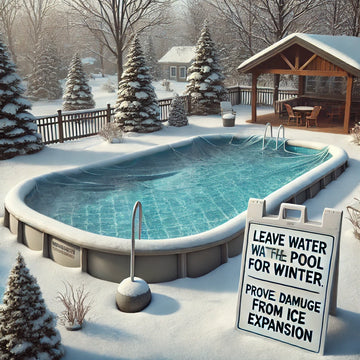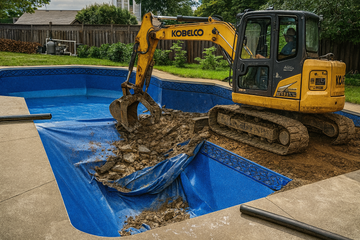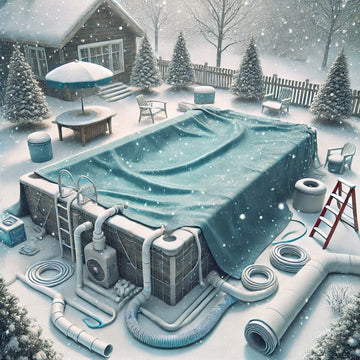WHY PROPER POOL MAINTENANCE AND CLOSING REQUIRE LEAVING WATER IN THE POOL OVER THE WINTER MONTHS
When the warm weather comes to an end, it’s time to start thinking about maintenance around your home for the winter months. And as swimming pool owners, we’ve all been here – “How much water should I leave in my pool for winter?”
We’re glad you asked!
There are a few important things to consider before taking the dive into pool closing maintenance.
If you’re new to pool closing, you may be asking yourself Can I leave water in a pool in the winter? The short answer is yes. A lot of people seem to think that when it comes to pool maintenance, they’re supposed to drain the pool entirely since they don’t want the water to freeze and become stagnant over the winter. But this isn’t best practice and could lead to several costly issues down the road.
Keep reading to find out why proper pool maintenance and closing means leaving water in your pool all winter long.
HOW WATER LEVELS PROTECT FROM ALL KINDS OF DAMAGE
Although it may be tempting to drain your pool this season, it can cause more headaches, and potentially large repair bills come spring. To avoid the need for inground pool repair services, leaving the right amount of water in your pool protects the liner from rips, tears, and other damage caused by debris during the off-season. Water will also keep your pool liner moist, which prevents damage caused by drying, shrinking, and cracking.
Reference: Pool Repairs for Winter Damage
WATER LEVELS, CHEMICALS, AND OTHER POOL MAINTENANCE TIPS
The type of pool you have, and the winterizing equipment you use, will determine how much water you should drain when closing your pool.
WHAT’S THE PERFECT WATER LEVEL?
Depending on the type of pool you have, there are typically two options for pool water levels. Out of these two options, though, draining your pool completely is definitely not one of them!
Completely emptying the water from your pool is harmful to the pool’s structure, foundation, and other vital aspects of your pool. The best thing you could do for closing is to leave as much water in it as possible so that it reaches standard height. If you’re draining some water out, the general rule of thumb—especially for in-ground pool maintenance—is to drain the water to below the skimmer and jets. This process helps you empty the pool lines and properly seal them for the winter preventing freezing or damage happening to the lines and pipes, which is especially necessary if you don’t have the proper tools and pool closing equipment.
Reference: 5 Pool Leak Detection and Repair Tips for Winter
Many pool owners also use an air pillow or foam in the winter to prevent ice sheets from forming and expanding which causes damage the pool liner, skimmer, and any pool structure opening.
To keep the air pillow afloat, you may need to add more water in your pool. For this reason, it’s best not to drain too much water.
While not the best option, if you do intend to drain plenty of water from your pool, you will need a tight-fitting cover that won’t sink or cave in from snow, ice, and debris. Without the support of water underneath, pool covers can easily rip from the weight of snow, and the water will become contaminated with dirt and debris, making for more work when you open your pool.
By taking the steps to properly close your pool this fall, you will save plenty of time and costs on pool maintenance next year. Remember, water protects your pool, so keep your pool water clean, covered, and at a reasonable level throughout the winter.
WINTERIZING CHEMICALS
An essential part of the pool closing process is to thoroughly clean the pool and balance the water with winterizing chemicals. Chemicals such as algaecides, chlorine shock treatments, and stain-preventing chemicals keep contaminants, dirt, bacteria, and algae out, so you don’t have to spend the extra time and effort cleaning your pool next year.
- Tips from the Professionals: Make sure you follow the chlorine instructions carefully! Improper use of chlorine could stain the liner or cause other damage to your pool. And if the circulation system is off, be sure to use an oxidizer.
The water level plays an important role here as well. If you drain your pool too low and add winterizing chemicals, the saturation will be a lot higher in a partially- or fully-drained pool than a pool that is sufficiently full. This could cause damage or discolouration to your lining.
Having clean, balanced water and chemicals in your pool will ensure it’s protected and easy to manage in the spring.
WATER, WATER, EVERYWHERE
Your pool’s water level may be more important than you had anticipated. So be the best pool closer on your block and save yourself from a hefty bill for pool damages caused by improper closing techniques. To do it yourself, follow our complete pool closing guide. Not enough time? Don’t worry about it! You can hire the experts to do it for you so don’t have to break a sweat.




